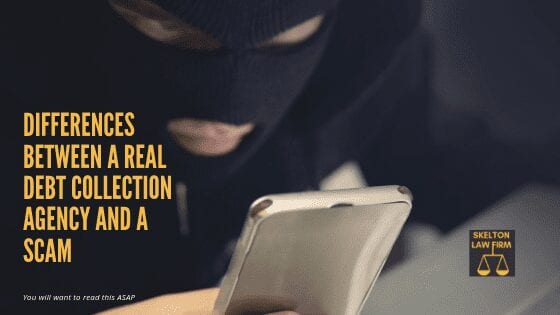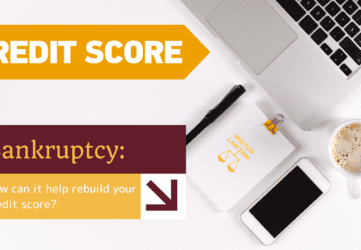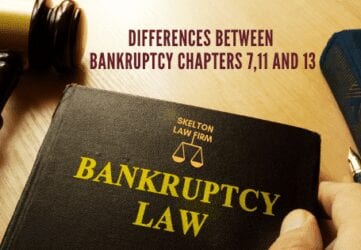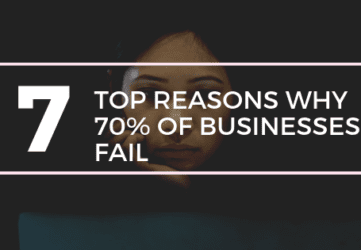A debt collection agency uses fierce tactics to collect a debt. Now you can learn Tips on How To Stop Creditor Harassment. However, if you suspect that the call is a scam there are ways to know the difference.

Scammers are very undignified and will forcefully attempt to get you to give your bank account numbers, give them your address and social security numbers. Hanging up until you are sure that the call is real is fine. Don’t give any information until you know.
There are clear indicators that will let you know that the call is a scam. Listen carefully to the call, and you will know the difference.
How a Scam Operates
Scammers may have gained access to your personal information. Do not panic. It is usually generic information like your name and phone number. They do not necessarily have your bank account information or credit card accounts. They can’t use the information to collect money unless you give it to them.
If they did use identity theft to retain information through your credit report, they only know who you owe money to. Most often, the scammers didn’t get that far. Based on what they say, you can usually search online and find out immediately that they are scam artists.
However, they will try to make it appear that they know you owe money to a particular company. They might be faking a collection from a highly used agency like Mobile oil, American Express, or companies that are accessed by millions of people.
In the past, debt collectors came on pretty strong, but scammers are becoming more obvious with abnormal threats such as calling the police or that they are sending paper documents about you to the courts. They may say that they are sending a person over to give you a court order. None of this is true or real. You can not go to jail for not paying a gas bill.
The Federal Trade Commission, (FTC) The Nation’s consumer protection agency has pages and pages dedicated to phone scams, who they are are and what they say called Scam Alerts. You don’t even need to owe money to benefit from this list.
Scammer’s Tactics Include
- Immediate punishment by the end of the day if you do not adhere to them is illegal to the fullest extent. A legitimate company will not say this.
- Not telling you the name of the collection agency at the introduction of the phone call.
- A legitimate collection agency must make this statement or similar. “This is General Collection Agency. We are calling in an attempt to collect a debt and that any information obtained from you will be used for that purpose.” They may record the call which is beneficial for your protection.
- If the fake collection agency gives you a false name, that is the name to search for online and will see that most likely the scammer has already been reported.
- Seek payment of money for an unrecognized loan.
- Asks for more money than you actually owe.
- Claims to be an attorney.
- Claim that you have committed a crime.
- Claim that they are affiliated with the police or are in conjunction with the Federal, State, or local government.
- Claim to be collecting on a “phantom debt.” These are debts that are too old to pay, were already paid/ are no longer valid.
- Legitimate companies will collect money through the mail in check form, certified bank check, online through their website, a debit card or cashier’s check. You can pay $5 here or do what they can to help you with a payment plan. They never have to collect “right now.”
- A scammer will want a large sum of money directly wired to them or collected all in one from a credit card. Never wire money to a stranger. They will refuse payment other than what they demand.
- They will not accept different forms of payment.
Three Questions That Will Reveal the Scam
The FTC recommends that you ask three simple questions to the caller in question that will reveal the scam.
- What are the names, addresses and phone numbers of the company that they are calling for?
- A legitimate company will be happy to provide you this information. If you still are not sure, tell them that you will not speak any further to them unless they send you a paper copy of a written “validation” notice. This notice must contain how much you owe, who you owe and include your rights under the federal Fair Debt Collection Practices Act.
- What is the name and address of the debtor that is trying to be reached?
- A legitimate company knows your name and address. A scammer does not or they will not have your complete name. Do not tell them if they have it wrong. Repeat that you want a validation letter and hang up.
- What are the last four digits of debtor’s social security number?
- A legitimate company will never respond to this question due to violating the Fair Debt Collection Practices Act (FDCPA).
- A scammer might try to answer the question. If they know it, hang up and call an attorney, the FTC, and get assistance. If they argue, hang up. If they stutter, hang up. Usually, they get mad by the 2nd question and hang up on you. This is a great way to know that they are bogus.
What To Do When You’ve Been Contacting by a Scam
- Report the call by contacting the FTC. You can also call your Attorney General’s Office. The federal FDCPA has copies online or will send you copies of debt collection laws.
- Call your creditor and find out if they are actually calling you.
- If you still are in debt and you do not know who is calling you, by all means, call an attorney that can figure out what is going on and free yourself from the hassle.
- Hang up!
You have so many rights and one of them is to call Skelton Law Firm at (360) 822-7224. Your Everett Washington Bankruptcy Attorney is willing to get you out of Bankruptcy, off the phone and into leading a great, knowledge-filled life.






